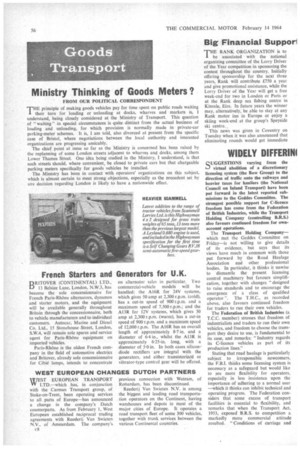WIDELY DIFFERINI
Page 58

If you've noticed an error in this article please click here to report it so we can fix it.
QUGGESTIONS varying from the virtual abolition of a discretionary licensing system (the Bow Group) to the direction of traffic onto the railways and heavier taxes for hauliers (the National Council on Inland Transport) have been put forward in the latest reported submissions to the Geddes Committee. The strongest possible support for C-licence freedom has come from the Federation of British Industries, while the Transport Holding Company (controlling B.R.S.) also favours continued freedom for ownaccount operations.
The Transport Holding Company— which met the Geddes Committee on Friday—is not willing to give details of its evidence, but says that its views have much in common with those put forward by the Road Haulage Association and other professional bodies. In particular, it thinks it unwise to dismantle the present licensing control machinery but favours simplification, together with changes "designed to raise standards and to encourage the emergence of a class of qualified operator ". The T.H.C., as recorded above, also favours continued freedom for traders to run their own vehicles.
The Federation of British Industries (a T.C.C. member) stresses that freedom of industrialists and traders to run their own vehicles, and freedom to choose the transport they desire to use, is fundamental to its case, and remarks; "Industry regards its C-licence vehicles as part of its production lines."
Stating that road haulage is particularly subject to irresponsible newcomers, the F.B.I. thinks some licensing system is necessary as a safeguard but would like to see more flexibility for operators, especially in less insistence upon the importance of adhering to a normal user —which it thinks can inhibit technical and operating progress. The Federation considers that some excess of transport facilities is essential to flexibility, and remarks that when the Transport Act, 1953, exposed B.R.S. to competition a markedly more commercial attitude resulted. "Conditions of carriage and
















































































































































































